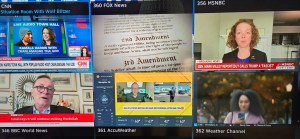Kamala Harris sat down with radio host Charlamagne tha God for a wide-ranging town hall aimed in particular at reaching Black male voters, amid some polls that suggest Donald Trump has made inroads with what has traditionally been a solid part of the Democratic coalition.
The last three weeks of the campaign look to be a search for votes via non-traditional outlets, which is what made Harris’ appearance a bit unique. Charlamagne has been a critic of President Joe Biden on his show The Breakfast Club but has been praiseworthy of Harris since she started her campaign, albeit he urged her to do more interviews.
“Folks say you come off as very scripted,” he said to Harris at the outset. “They say you like to stick to your talking points. Some media says you have –”
“That would be called discipline,” Harris interrupted.
He noted that Saturday Night Live has parodied her for it.
“What do you say to people who say you stay on the talking points?”

“I would say, you’re welcome,” she said, adding that “there are certain things that must be repeated to ensure that I have everyone know what I stand for and the issues that I think are at stake in this election,” she said.
CNN simulcast almost the entire iHeartRadio hour, while MSNBC carried a portion of it. Fox News referred to it during The Five.
Noting that the election was a “margin of error” race, Harris used the hour to talk a bit about her background the religious faith, while reemphasizing her economic agenda and how that would help the Black community in particular. That includes proposals to boost assistance for home down payments, expand the child tax credit and small business loans. A more recent proposal provides $20,000 in forgiveness to small business loans.
One caller asked her what her stance was on reparations, adding, “Black Americans are heavily asked to vote Democrat in every election for half a century, with very little in return. What are your plans to address these very important issues and change that narrative?”
Harris answered, “Yes, I am running to be president for all Americans. That being said, I do have clear eyes about the disparities that exist and the context in which they exist, meaning history.” She said that reparations had to be “studied, there’s no question,” before going into an extended, five-minute answer on her background and agenda.
The hour was heavy in criticism of Trump, with Harris at one point expressing agreement with Charlamagne’s characterization of her rival and his movement.
“I think it’s about fascism,” he said. “Why can’t we just say this?”
“Yes, we can say that,” she said.
After a question about her support for Black churches, Harris noted that “he’s selling $60 Bibles or tennis shoes and trying to play people as though that makes him more understanding of the Black community. Come on.”
Harris also pushed back on claims that she targeted Black men for incarceration when she served as district attorney of San Francisco.
“Some say you did it to boost your career, some say you did it out of pure hate for Black men,” Charlamagne noted.
“It’s simply not true,” Harris said. “What public defenders who were around those days will tell you is I was the most progressive prosecutor in California on marijuana cases, and would not send people to jail for simple possession of weed.” She said that as president, she would work on decriminalizing it.
Charlamagne also asked Harris about a rumor “that Janet Jackson is mad at you because you prosecuted her brother, the late great Michael Jackson.”
“This is not true, on either count,” Harris said, laughing a bit.
She added, “I don’t know. I have not talked to her. Certainly it’s not true about her brother.”







